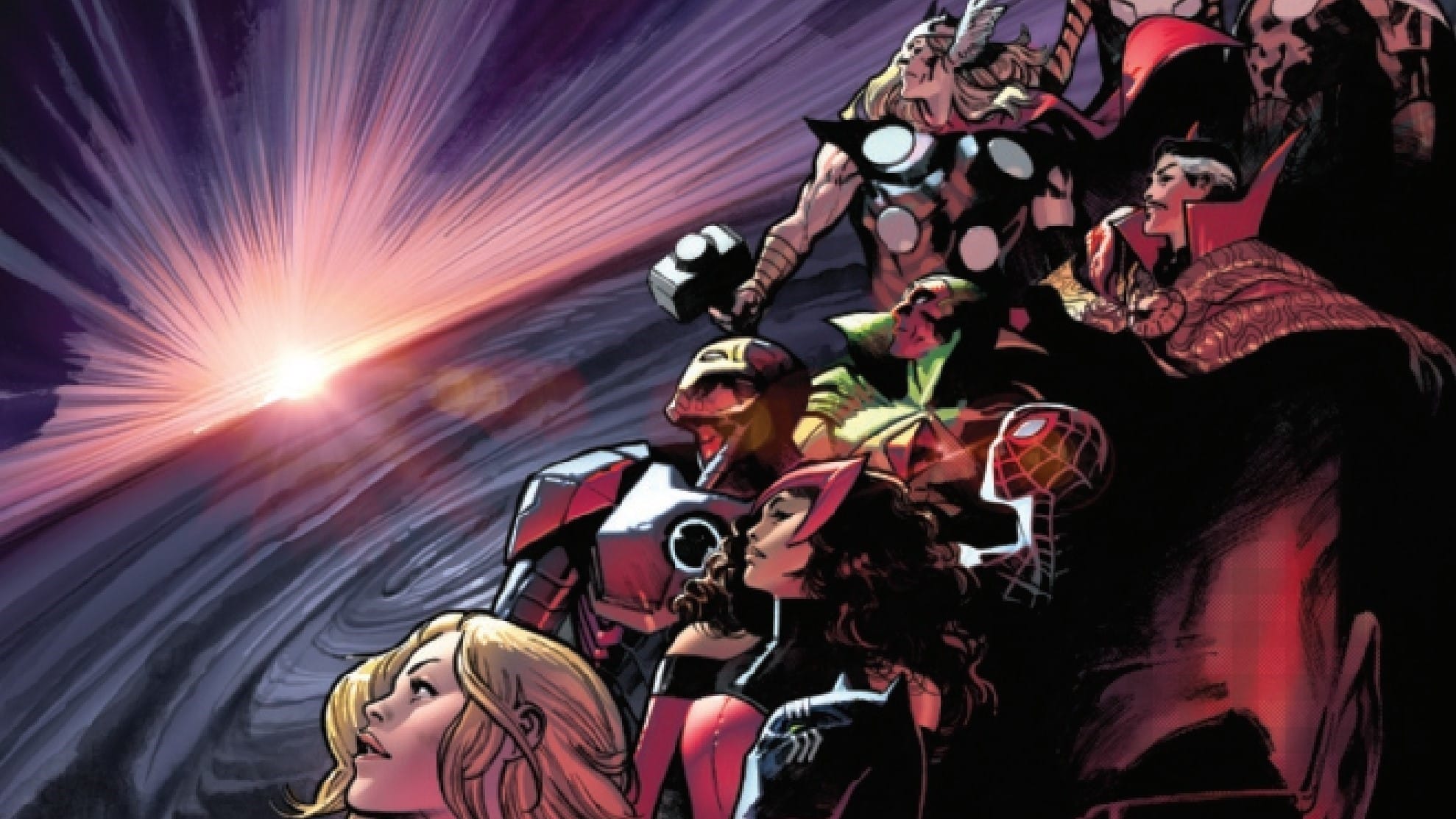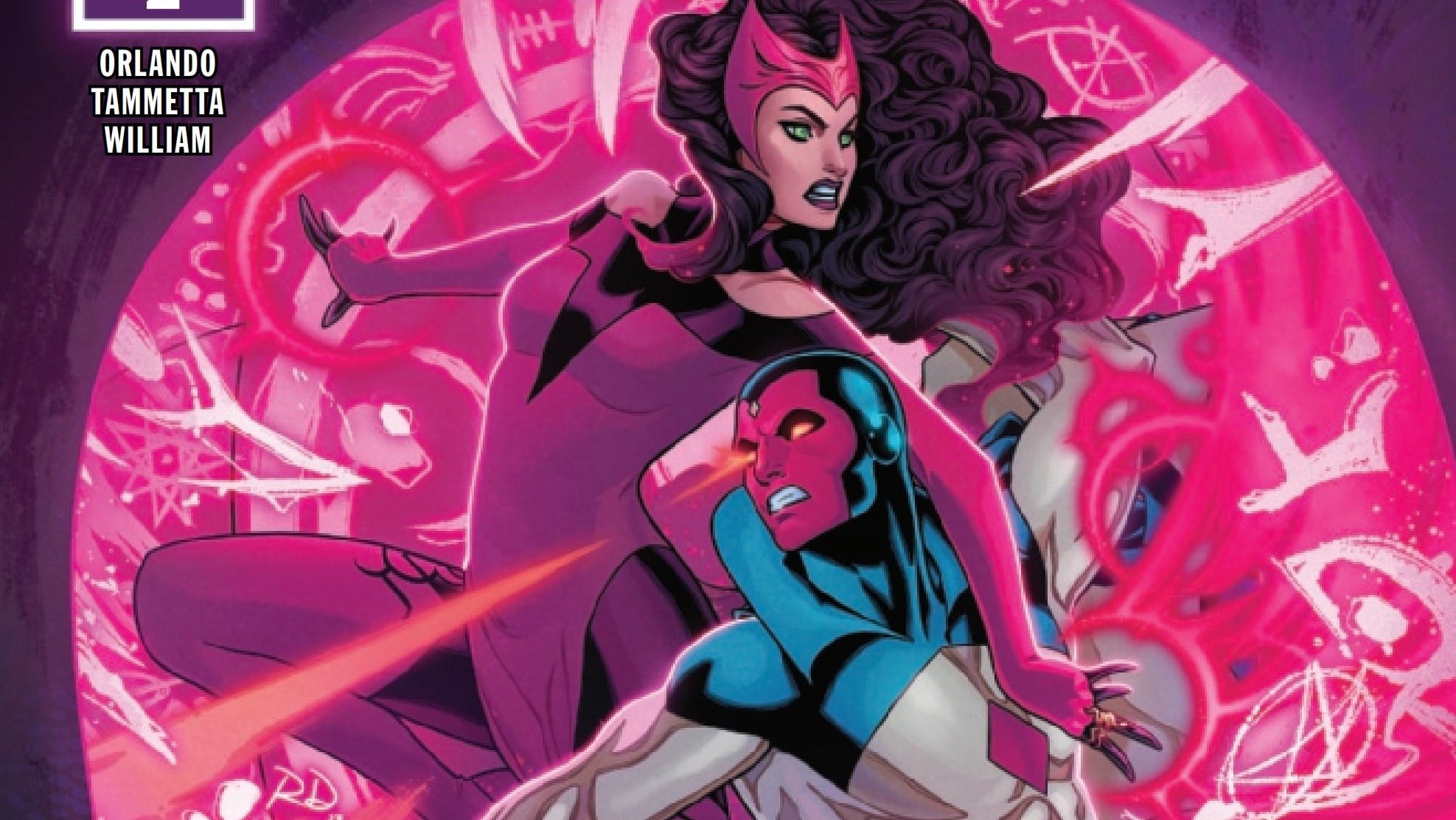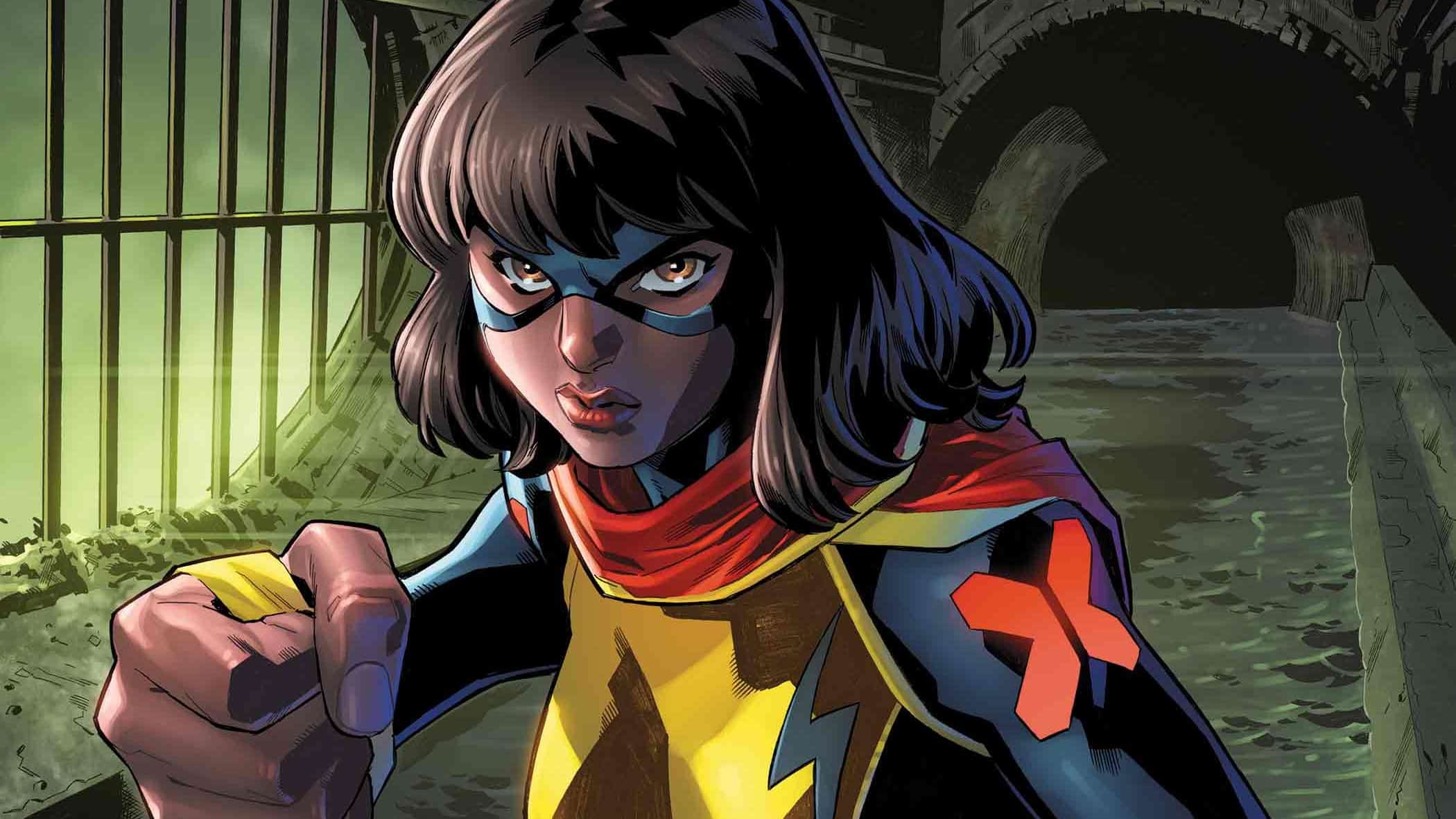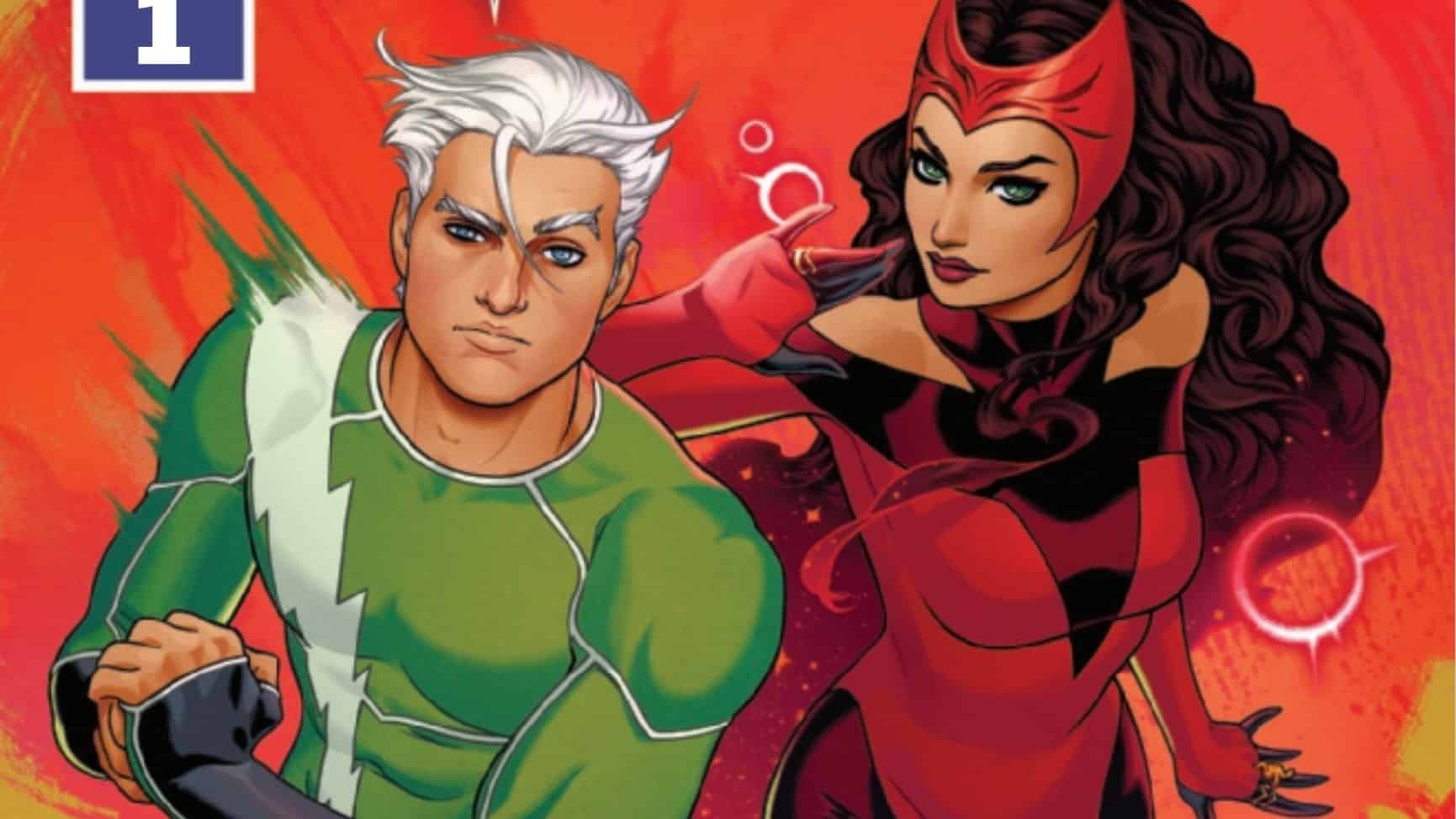Readers we have a special presentation this week as actual college professors/authors Stephanie Burt and Rachel Gold cover the one-shot, Doctor Strange: The End by Leah Williams, Filipe Andrade, and Chris O’Halloran. Can the good Doctor thrive, or even survive in a world of dwindling magic in the increasingly technological Holocene era?
Stephanie Burt: Background we should give coming in— all “Marvel: The End” stories are alternate non-canon universes telling the very last stories for the title characters, usually because the characters die [Ed. Note: They take The End very seriously]. So we know from before we open the comic that Dr Strange’s own story ends here. We don’t know how or why he’s going to die and what’s going to happen, both to the magic system he understands, and to the Earth he, as Sorcerer Supreme, guards.
We come in wanting to love this story, because What If? Magik Became Sorcerer Supreme, with the same team as this one (Leah Williams and Filipe Andrade) was maybe our favorite single-issue comic for all of 2018. This story feels like it could be a sequel to that one, set in the same alternate universe, though we don’t know for certain that it is.
Rachel Gold: I’d happily read dozens of issues set between What If? and The End. I haven’t seen nearly enough of Dr. Strange teaching Illyana how to better use her magic. (Uncanny X-Men vol. 3 #29 is perhaps the best of these moments currently on page outside of What If?)
This isn’t the first time we’ve seen Dr. Strange dealing with a crisis of dwindling or lost magic. There was the somewhat perplexing Last Days of Magic (which includes the comic book of that title and the 2015 Dr. Strange series issues #6-10). But for that crisis he had a lot more help than he does for this one—or at least living help.
A Bite at the Apple
SB: I love Andrade’s visuals on the opening pages so much. At first there’s almost no background and then we gradually see what the now-elderly Stephen Strange wants his Sanctum Santorum—as well as his Alexa—to look like. She’s a youngish, conventionally attractive white woman in a little black dress. I like the way her image splits the difference between “rebellious subordinate” and “male fantasy”: she looks just right for this role.
Strange wants her to be able to bite that apple, take that risk, interact with the mystic, but she’s not really sentient and able to feel—the way other Marvel AIs like the Vision are—so of course she can’t interact with the mystic realms. And she knows it. And he should know it. That first pair of sidebars does a lot of work: “Some days I’m able to delude myself into thinking magic is just nonlinear science. It is not.”
I feel for the guy but I already don’t trust him. And I feel very bad for her. If Mystic.exe, or whatever her program is called, isn’t fully a person, then of course she’s not going to be able to eat the apple or interact with the mystic realm, and if she IS fully a person, he’s being a jerk.
RG: We don’t actually know that this is a universe where semi-sentient programs can’t interact with the mystic realm—and we get some evidence later that they can. But clearly she’s having a hard time despite really wanting to do this (or being programmed to want it).
We also see that in the first half of the comic book—in fact for most of it—Dr. Strange is not having any good interactions with living people or programs. There are street toughs who laugh at him, plan to steal from him and then are terrified of him. And he has an AI that he destroys just as she starts to learn magic. What has happened to him and his world that makes it so hard for him to have good interactions with people?
SB: He’s often been portrayed as relatively isolated, both by his temperament (he was a real jerk before he got powers) and by his responsibilities. And regular non-super people without strong social networks can isolate themselves as they age. Especially if they’re people, like Stephen, whose self-worth all lies in their job. And who have…. Issues… with how they treat subordinates.
RG: He does a very good job of embodying some of the best and worst of Western cultural systems. And I think that’s evoked well in the fact that he can’t teach an AI to eat an apple—a symbol that can represent knowledge, adulthood and independence—but he can teach her to cry.
SB: In those first pages, he’s also performing a Tarot reading for the street toughs and the reader. It’s in character for Dr. Strange to explain Tarot accurately for the reader—these are cards you can use to read yourself and your friends and your future if you learn how, you don’t need mystic abilities—while holding these cyberpunk street toughs in contempt.
Do the thugs look familiar to you? People I trust say they came from The Dark Knight Returns, a book I really have no desire to reread, though I guess it’s an influence on many The End stories; I think the thugs look like they came from Transmetropolitan, because they think they’re being edgy but they’re not. Also they picked the wrong old guy to rob.
RG: The second card he draws, Three of Swords, is a great choice because it’s a card of heartbreak and not having moved through one’s own grief—and this is definitely a world in grief. If he’s pulled these cars for us, the readers, as well, then it’s an instruction for us to feel the grief about the state of the world we’re in but also to move through it, keep going, find new possibilities and futures.
And if that card applies to the entire world of this comic book, then The Fool should also apply, which means this is a world badly in need of a leap of faith. The Fool has a lot of openness and innocence (but not ignorance), does not hold grudges and is unselfish. Based on what we’re going to see in this issue, Dr. Strange and his companions could’ve used more of that Fool energy.
Solo Practitioner
SB: We see Wong’s icon in a long, mostly bronze-colored panel right after Mystic Alexa disobeys a direct order from Dr. Strange. This layout and art reminding us that Silver Age Wong began as a super-racist caricature of Asian subservience, but then grew and changed. Dr. Strange tries and fails to invoke Wong before he leaves home. He’d love Wong’s help but Wong is no longer available in that way, so Strange has to guess what Wong would want him to do [Ed. Note: WWWD?]. That green flame dissipates. Strange no longer has the energy to reach out and make the connections he needs to make, including connections to his own past, let alone to other magic systems.
RG: Here’s where things start to get very interesting involving the magic in Dr. Strange’s world. He says to Wong, “I can feel your scorn pinching me from the spirit realm,” so he must still have some connection to a spirit realm, but no power is coming through to him. Earlier he described the street toughs as “mystically disadvantaged,” but this seems to apply equally well to him at this point in his life. The universe or multiverse doesn’t run out of magic—as we’ll see later—but individuals and cultures can or at least can think that they have and become trapped in their own perceptions.
SB: Strange seems to think he’s dealing with the Tolkienesque problem of a whole universe losing its magic, but we figure out gradually that he’s really dealing with a classic problem of succession: who’s going to come after him, who’s going to have the ability and the responsibility to put the magic back (either through acts of spellcasting, or just by existing)?
RG: I may be reacting in part because the Voudon I saw in Cloak & Dagger (the TV series) was SO GOOD. But Dr. Strange’s problem sounds like the Western/European magic system thinks it’s all there is and at this point in this world it has imploded. It seems that Dr. Strange has made the mistake of thinking that it comes down to one aging white guy who has to contain all the magic within himself and save the world again—or pass magic on to a single person who will.
RG: The part where his assistant says: “without a population of sorcerers, mystics and witches to aid you in the nourishing and sustaining balance of magic energy, as the world’s sole remaining practitioner of magic” just begs for panels of everyone in Wakanda’s ancestral plane standing around saying, “Wow, really? You’ve got to do it all yourself? You can’t even work the basics of ancestor magic?” What happened in Dr. Strange’s part of the world to cut off the ancestral plane? He obviously knows the power of that magic since he spends a significant part of the comic going to the graves of other sorcerers to get their remains.
SB: “White guy used to being in charge has to learn to share” is…. Not a bad plot. It’s a square or two over from the classic superhero plot “We can defeat the bad guy if we team up, doing things none of us can do on our own.” Which is the basis of almost every good fight in every X-book ever. This Dr. Strange—who *looks* so tired, so tired: the art team really sold that look!– does seem to want more help than he can get. For Some StrangeTM Reason he’s the only one left. The Final Girl as the Final Old Dude, as it were. How do we feel about the way he seeks help?
Of course he can’t get help from MysticAlexa, whose name turns out to be Jenny (which could be a homonym of Ginny, as in Engineered). He never trusted her with the name of his mystical flame. But he did trust Illyana.
Whose image, as projected by Jenny-Alexa, is super-kissy-faced in an enticing anime way that lands quite far from the swirly mystic sophisticated look of the sanctum. She looks almost disturbingly young, maybe because her own trauma in Limbo disrupted how she ages, or how she looks. She’s also wearing the New Mutants black and yellow, which means that in this timeline she joined the New Mutants, which means—I think—that we can’t after all be in the same timeline as What If? Magik. Illyana must have connected to Dr. Strange earlier. Possibly in the way that she connected with him in the 616, after her death and resurrection. But he’s been able to develop what I hope and assume was an entirely appropriate sorcerer-student relationship with her.
RG: I still think this could be a continuation of What If? Magik. While Dr. Strange is training Illyana to be the next Sorcerer Supreme, she’s not precluded from also teaming with the New Mutants—and is probably a more effective team member since she’s getting that training. Her teleportation makes it easy to do both.
SB: That’s a good point. We know right away, on the same page as her apparition, that he thinks he has failed her in some way. Look at his face. “And you know what happened with Illyana.” A hint. A story for another time.
SB: This aged sorcerer has come to a really rough place. He feels all alone, even if we learn that he is not. I wonder how much help he sought, and how much help he got, in the decades when he was searching the multiverse for Illyana’s missing essence/ body/ life?
RG: This seems like another universe in which Illyana didn’t get good therapy after Limbo. Though as we’ll see at the end of this comic book, she may have gotten some workable therapy after all.
The Skulls that Pay the Bills
SB: I get the feeling that Williams’s Stephen Strange was the kind of student who hated group assignments in school, because he wanted to earn his own A. That’s in character for the main Dr. Strange continuity, right?
What do you make of that pile of skulls in the big ornate box? Are the skulls buried in Wanda’s tomb?
RG: He went around and got other remains in addition to Wanda’s. Clearly on page he’s picking up Jericho’s too. There are a number of other sorcerers with him in the Doctor Strange and the Sorcerers Supreme series, so maybe their remains also. That’s an interesting series to contrast with this issue because the Sorcerers Supreme seem to work well together. I think Williams chose very well for the story she’s telling about this particular version of Dr. Strange’s future—and at the same time he’s a character who, more than others, makes me want to compare his many possible futures and understand their causes.
He also talks about the “purveyors of the arcane” hiding magic from each other. How did that happen? We could assume this is a world where Wakanda just up and left and Afro-futured to the stars because that’s one way black people can finally be free.… Which might explain why this is an Earth where future magical generations weren’t born: the Western white people did not value magic, so the magic went away with Wakanda and all the other connected magical cultures that simply left. I’d love to read that story, including their return.
SB: I can think of three people *right now* who could write that story, counting only people who identify as Black and already write comics for Marvel.
RG: You’ll also notice that pages after Dr. Strange laments the various magic folks he knew working “so hard at hiding our mystical resources,” he goes on to talk about how they “began collecting and safeguarding our last, most precious mystical resources for all the future magical generations to come, we assumed. But they never came.” Notice how it’s *the same phrase* both times, “mystical resources.” That suggests to me that those resources are collected, safeguarded and hidden. Maybe that’s the reason the next generation hasn’t come. Dr. Strange’s generation hid the mystical resources (of European cultural magic), determined to reveal them only to the worthy, but didn’t have the capacity to see the value in the next generation.
SB: That tracks with the way elite institutions behave in our world too. “You have to be trained to use this stuff, so we’ll lock it away and impose a stringent admissions test.” And the institutions just end up sitting on their hands and on their resources while the world burns.
Dr. Strange is really upset that the mystic resources to which he has access are never found … in the parts of the Earth where most brown people live. Huh. Maybe he didn’t ask enough of them? Or didn’t ask politely?
I think Leah Williams has written a terrific story about a guy who nearly failed by trusting his white self too much, and trusting the Other too little.
RG: In addition to trust, I think it’s about what he can and can’t see. There’s a sense that he didn’t have a chance to trust other resources because he never realized they were there.
SB: Wouldn’t be the last time Illyana had to pick up the pieces after that sort of thing went down. Could be the first time she gets to pick up the pieces in a way that leaves her in a more secure and confident position, rather than, say, de-aged, or in X-jail.
RG: That’s one of her secret jobs in the Marvel universe: show up and clean up and take the heat for it when there’s heat. In some universes, her hero tagline is, “You’re welcome.”
Having a Good Timeline
SB: Speaking of heat, can we talk about the death and dissolution of Stephen Strange? Because it’s beautiful– “@#%$ Magnificent,” as he puts it. All credit to Chris O’Halloran, who did the coloring! It’s a good example of what modern comics coloring can do– including the flat colors where they’re appropriate, and the contours on the nonhuman beings when Strange’s spirit extends throughout the multiverse.
The pencils are pretty great too– those entities with boobs and insect wings hanging out on what looks like a phone pole look great: they could be listening to an oud recital or looking for a bite to eat. We just don’t know. I’d love to meet them and learn their language. I think.
I do wonder what Leah means by “the teetotaling universe,” and what word’s supposed to be there. Is there another universe that drinks alcohol, and everything’s different there?
RG: The now-deceased Dr. Strange says, on finding the dormant Illyana, “I had awoken a dragon.” And we see Illyana’s eyes open. This brings to mind Ursula Le Guin’s speech “Why are Americans Afraid of Dragons?” in which she says that Americans—or adults, Le Guin is talking about both—know that fantasy “challenges, even threatens, all that is false, all that is phony, unnecessary, and trivial in the life they have let themselves be forced into living. They are afraid of dragons, because they are afraid of freedom.”
Was magic rendered inaccessible to Dr. Strange’s generation and culture because of a focus on the false, phony and unnecessary? Because of greed and materialism? As Le Guin says in that same talk, “There is an inverse correlation between fantasy and money.” And as we saw at the start of this exciting issue: the street thugs can only pay for a “reading” (Dr. Strange uses air quotes), they cannot pay for or buy magic.
SB: Another thing I love about this art is the way the heavily curlicue’d, almost Art Nouveau pages interact with the chilly solid-color background pages (another good example is the sequence where he’s climbing the mountain with the box of skulls-and-Wong on his back). The spare parts make the heavily ornamented ones stand out.
One of the things I don’t love is the cutesy anime-eyes on resurrected Illyana. Why? What is she doing in that pink amnion anyway? Who put her into that “crushing enchantment”? I guess that’s just another story to be told.
I do love the way that once she wakes all the way up she is 200% done with being seen in the way that Dr. Strange has seen her. She makes me think of my favorite bits of William Blake, which I think might be her favorites too: “I have innocence to defend, and ignorance to instruct;/ I have no time for seeming, and little arts of compliment/ In morality and virtue: in self-glorifying and pride.” She’s got %@#$ to do. And fast.
RG: We know Illyana is awoken from the enchantment by Eternity, which is the animating principle of the multiverse. This is also a main reason I believe magic isn’t gone from the multiverse or this particular universe, only from Dr. Strange’s immediate surroundings: as long as Eternity exists, magical potential is present [Ed. Note: Eternity does exist for…a long time] It’s also one possible way to be showing that Illyana did get some therapy: magic therapy from Eternity.
I’m hoping the way that page goes from cutesy eyes at the top to Illyana as a naked woman with hips signals that in this world Illyana will grow up (and please—artists and powers that be—get a new hairstyle).
SB: Will you glare at me if I say that I like the bangs?
RG: I will not! I’m okay with the bangs as long as they’re paired with something like an undercut to show that she’s growing up. The trend of always drawing Illyana like a teen, while other New Mutants have gone on to age, signals that her trauma keeps her frozen at a younger age than she is. And I think it’s past time that we see what Illyana can do as someone who has integrated that trauma into a larger, fuller life.
SB: Dr. Strange has sacrificed himself– his story is over– to locate and rescue an inspiring younger character, Illyana, whose whole backstory is about becoming and the power of intersubjectivity. About learning to live with her own sexuality; with her traumatic past; with her own aggression (in the original Magik miniseries she can’t make an acorn, but she can make a sword). She’s a character who, in this timeline, will make a good teacher, partly because she has such a strong history of not caring about appearances, not caring what other people think. I’d attend that academy.
How do you feel about the very end, where Stephen takes the place of Wong in the shrine?
RG: It fits, because he was one of Illyana’s teachers. (I’m assuming she’s also learned a lot from Eternity and some others.) Dr. Strange has done so much good in the multiverse and clearly deserves a place among the honored ancestors. And Williams tells very good stories about Dr. Strange and Illyana! She’s ended this one powerfully by emphasizing the importance of their teacher-student relationship.
I hope Illyana is better at ancestral magic than Strange was—actually I’m going out on a limb and saying I know she is. It’s beyond the scope of this story, but I’m wishing for pages at the end with Illyana opening a space for all the magical ancestors to come back into the residence of the Sorcerer Supreme. Illyana is from Russia, specifically eastern Russia, which is very much part of Asia. She has access to a variety of non-European magical systems and understands that European magic is not the only magic. And because she is so white and has clearly been treated that way post-Limbo, she is a perfect person to help create an inter-connected magical world.
SB: She has Dani Moonstar’s digits, too. I hope Dani is still alive in this timeline.
Speaking of which, if you like Leah Williams’s Illyana you need, and I do mean need, to read this.
That’s canon for this timeline, right?
RG: Looks canon-compliant to me. There are so many ways for Illyana’s timeline to go that I’m not sure we’ll ever get tired of coming up with them and reading them. <Looks pointedly at Leah Williams> Just in case this writing & art team want to give us more of this goodness.
SB: Agreed. I think that’s what she’s gonna do. In this timeline. Maybe in others too.
Stephanie is Professor of English at Harvard and the author of several books of poetry and literary criticism, most recently Don’t Read Poetry: A Book About How to Read Poems (Basic, 2019). Her nose still hurts from that thing with the gate.
Rachel Gold is the award-winning author of five YA novels about queer and trans and comic-book-reading teens, among them Being Emily (2013, second edition 2018) and In the Silences (2019). They teach at Macalester College in St. Paul, Minnesota.
Chris Eddleman is a biologist and co-host of Chrises On Infinite Earths.






